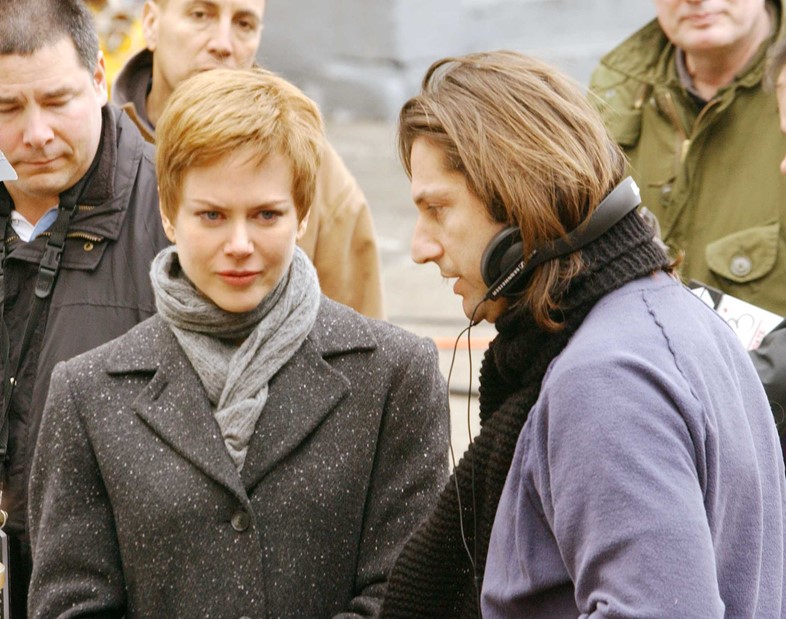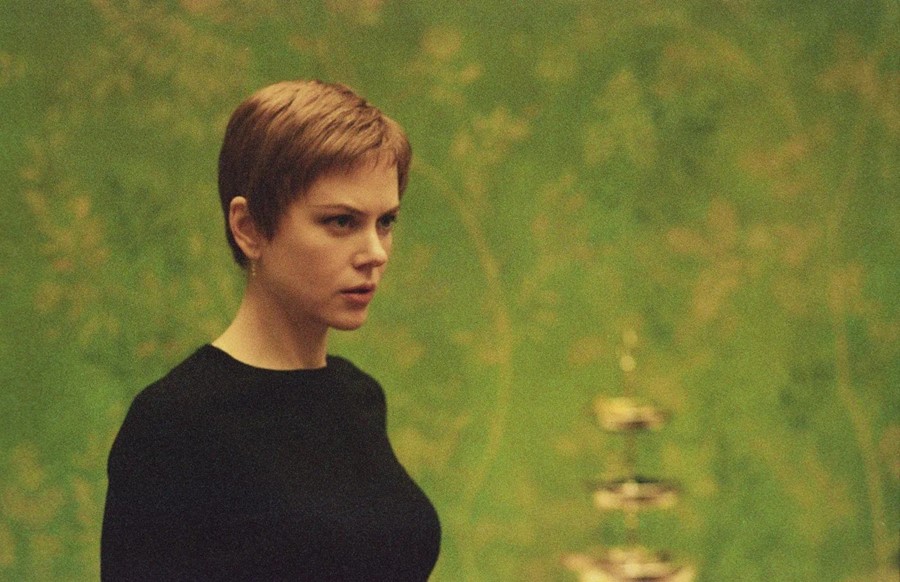Can romantic love travel from generation to generation? Jonathan Glazer and Milo Addica’s 2004 film Birth is a complex love story with a dark twist – in this Dazed archive piece, they talk us through their creative collaboration
Welcome to the Archive Pull, a new series delving into the 30-year history of our print magazine. To celebrate the film’s 20th anniversary, we look back at our interview with director Jonathan Glazer and screenwriter Milo Addica, originally published in the December 2004 issue of Dazed & Confused.
Jonathan Glazer is a director who makes possible the impossible. Horses stampede through surf, French actor Denis Lavant walks through an underpass, absorbing the impact of an oncoming car, his face a mask of numbed suffering. Glazer’s latest feature film, Birth, a follow-up to 2000’s Sexy Beast, tells an impossible love story in which uptown girl Nicole Kidman falls for a downtown boy. But the boy is ten years old, and claims to be the reincarnation of her dead husband.
Glazer‘s first collaborator on the script for his second feature was Jean-Claude Carriere, a one-time Luis Buñuel scriptwriter. Then came a second script with producer and scriptwriter Milo Addica (Monster’s Ball). But that draft became two, then three and so on. 21 drafts later, Addica and Glazer were locked in a furious sculpting game, chiselling and stripping the story to its essentials, writing late into the night in a New York apartment while Glazer shot scenes during the day. All this under the watchful gaze of Miramax, a studio well known for its meddling. As they embark on their second film, an adaptation of Michel Faber’s Under the Skin, Addica and Glazer explain how they steered this battleship of a film past an American studio, and why the wounds are only just healing.
Where did the idea for the story come from?
Jonathan Glazer: Actually, I remember it quite specifically. You never usually remember the origins of an idea. You never know if it’s a version of something you’ve seen before. But I was in my kitchen with a friend, walking over to the kettle, talking about something completely unrelated. And I said to him, ‘I just had a really good idea for a film. There’s this little kid and he tells a woman he’s her dead husband. And he’s ten.’ And then I finished making a cup of coffee.
Where did it go from there?
Jonathan Glazer: Like anything I do, I tested the idea by whether it stayed in my head or not. I’m looking to see if it’s fertile. A couple of weeks later, I wrote it down and extended it into a paragraph, which I took to Jean-Claude Carriere in Paris. He had this book of different love stories from the movies. And I remember him flicking through the book, closing it and saying, ‘No, it’s not in there.’ And then he told me that it hadn't been done for one of two reasons. One, the idea can’t be done. Or two, nobody has thought of it. And he was pretty intoxicated by the idea. So for about eight months, I was going back and forth to his flat in Paris pretty much every weekend, turning this paragraph into three acts.
When did Milo come into the picture?
Jonathan Glazer: We were working on a different project, on the Michel Faber book, Under the Skin. Milo was looking over my shoulder at the scene from Birth I had on the computer and said, ‘what if this happened instead of that?’ And that’s how it started. I asked him to do a draft and he did.
Milo Addica: And we stopped Under the Skin mid-stream. The first draft of Birth was solid, but the voice was completely different. Jean-Claude is an extraordinary writer. He’s a legend. But it wasn’t what I knew about Jon. The piece was a little lighter than I had expected it to be. Not that I’m saying that we brought in Dr Death or anything.
How did things go with Carriere after that?
Milo Addica: We went to see Jean-Claude. It was a typical wet and overcast Paris day. At this point, it was just meet and greet. We’re smoking and it’s relaxed. But when Jon and I started to work on the script and we delivered it to Jean, he turned on us. ‘What is this? What is this you give me?’ All in his deep French accent. ‘This is not what we talked about.’ But of course it’s not what we talked about. We’re from different generations. He’s coming from a different place. Here’s one example: The boy was originally called David. But I wanted Sean. Sean would sound nicer when Nicole said the word, Sean. David just sounded too biblical to me. And Jean got past the name. But he did feel that the boy was becoming more like a teenager. I didn’t want him so passive. But then we started talking... he’s a passionate guy and he cared about the work.
Jonathan Glazer: Jean-Claude is a brilliant man. But I felt the need to interpret the story with a different voice. Jean-Claude understood that. And Milo’s first draft was taken up just like that. We got the cast on the back of it; we got the money on the back of it.
“There were a lot of unhappy people [in the studio]. It was really fucking vicious” – Jonathan Glazer
How did your script with Milo differ from Carriere’s?
Jonathan Glazer: The original script was more about people sitting around discussing the idea of reincarnation. But we wanted to flush that out. Let’s get past that question of, ‘is he or isn’t he the reincarnation of her husband’. Assume that he might be and understand why she so badly wants him to be. The film works on an emotional level. Whether people think he is her husband or not, whether they understand the story or not, your heart still takes you somewhere and you still feel something.
Milo Addica: All in all we wrote in excess of 21 drafts, and that’s not including the re-shoots. That’s the process, or rather that’s our process. Often we used a tape recorder. And we’d improvise a lot. We’d act scenes out, then write them down. I was here in London for two and a half months. Then we went to Scotland and we also worked in LA and on the phone a lot.
Jonathan Glazer: We were on the phone for hours! But, when I got to New York on the first day of pre-production, only eight weeks before we were due to start filming, I phoned Milo and said, ‘we’ve got to rewrite this’.
Milo Addica: Yeah and that’s when we really started writing. Eight weeks before we were supposed to be filming.
Jonathan Glazer: I don’t know why we did it. I suppose it was a gut reaction, intuitive, a feeling that we had only just touched on what it was all about. So, Milo came to New York for three days and ended up staying for 13 weeks. So for the entire pre-production schedule, when you're supposed to be doing everything other than writing the script we were writing the script.

Milo Addica: A lot of things started crystallising the closer we came to shoot time.
Jonathan Glazer: Listen, you have to understand this. We were making a film for an American studio. This is not how it happens. We sold them a draft, cast it. And then we turn around and say that we are rewriting the entire piece as we go along.
Milo Addica: We snuck it past them.
Jonathan Glazer: There were a lot of unhappy people. It was really fucking vicious.
Milo Addica: They’re getting happier now though. But I was scared about what we were getting into when we started throwing pages away. I knew what that meant. That I’d be there till the end. We’d get together after each shoot. We'd come back to the flat where I was staying in New York and work till three o’clock in the morning. And knowing the people above us were scared too was just unbearable. Now that the film is finally here, it’s anti-climatic in a way. The wounds have not healed.
Jonathan Glazer: It was just hard, but that’s the process we chose. Milo and I just locked down to one another. And we just cut everything else out. At that point, we had no option. We became an island to get it done. That’s all we wanted. The film was a like an enormous battleship heading in one direction. And every day we were saying, ‘Can we turn it around today?’ But I had the actors absolutely on side the whole time, without their cooperation it would have fallen apart. Nicole particularly was absolutely determined to support what it was we were doing.
“I can see why some of the best films take a decade. It doesn’t end. You just run out of time” – Jonathan Glazer
In what way did the script change in New York?
Jonathan Glazer: The script that we arrived with in New York was about the boy. And the film we made was about the woman.
Milo Addica: Well, it was still about the boy, but Nicole’s becomes the dominant perspective. We look at the boy through her eyes.
Jonathan Glazer: The boy (Cameron Bright) made our minds up about the switch from Sean to Anna (Kidman). Casting is everything. There was a kid I looked at who was fucking fantastic, but he was 13 years old. With him, there was a whole area to explore. But with our boy there was nothing. And that’s why we explored her. And thank god we did. Because Nicole’s turned in something spectacular. And maybe not now, but in a few years people are going to see how good that performance is.
Milo Addica: We had to write dialogue around the boy. You were like an animal wrangler.
Jonathan Glazer: It was hard. It was hard because he’s got to carry the whole thing on his shoulders. If you’re not going to believe him then it’s all dead. And there is chemistry between the kid and Nicole. There just is. We detected that very early on and that’s why we cast him. There wasn’t anyone better that I’d seen. And that chemistry is the hardest thing to get. Without that you have nothing.
And the questions kept coming from the studio?
Jonathan Glazer: Boy were there questions. Yeah, they were 20 per cent behind us the whole way!
Milo Addica: With the studio, it’s a series of battles and the last one will be when we pay tax on it.
Jonathan Glazer: The last one will be when we get paid.
Milo Addica: They said that they wouldn’t approve the ending that we wanted to do. It’s difficult to write a piece if you don’t know whether your ending is going to be approved.
Jonathan Glazer: We didn’t write the end until we were walking around a supermarket buying biscuits two days before we shot it. We could still be writing that film. No question. It’s a non-stop series of conundrums. You can constantly put layer onto layer.
Milo Addica: The potential is just infinite. But at some point you have to just stop because you need to live. Otherwise, it’s a ten-year project.
Jonathan Glazer: But I can see why some of the best films take a decade. It doesn’t end. You just run out of time.




